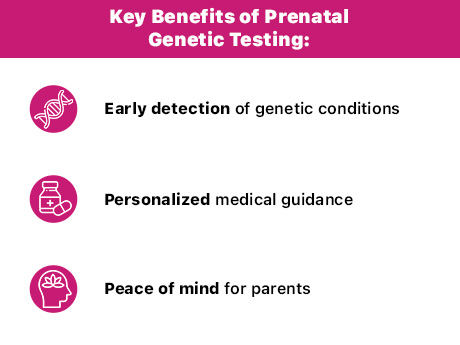
Bringing a new life into the world is a beautiful and life-changing journey, but it also comes with questions, hopes, and concerns. How healthy is the baby? Are there any risks you need to prepare for? With advancements in medical technology, Prenatal Genetic Testing has become an essential tool to ensure the well-being of your unborn child. Whether it is for peace of mind or early intervention, this process provides critical insights during pregnancy. However, like any medical procedure, there are both benefits and risks of prenatal testing that every expectant parent should be aware of. If you are considering prenatal genetic screening or looking for genetic counselling near me, in this blog we will help you understand what it involves, its advantages, and potential risks. Let’s explore this important topic together.
What is Prenatal Genetic Testing?
Prenatal tests are specialised procedures used to diagnose certain chromosomal and genetic conditions and complications in a developing fetus. Unlike non-invasive tests that only screen for potential issues, invasive tests can provide definitive diagnostic information that helps you to make informed decisions. These tests are typically recommended when there is a higher risk of chromosomal or genetic abnormalities, such as when parents have a family history of genetic disorders or previous screenings have indicated a potential issue. Understanding the Prenatal Genetic Screening options and implications of these tests can help expectant parents make early.Types of Prenatal Genetic Testing at The Garbh
At The Garbh, we offer two advanced and reliable prenatal genetic testing methods to provide you with critical insights into your baby’s health during pregnancy:
1. Chorionic Villus Sampling (CVS)
What is Chorionic Villus Sampling (CVS)?
Chorionic Villus Sampling is a prenatal diagnostic test performed between 10 to 13 weeks of pregnancy. This procedure involves collecting a small sample of tissue from the placenta, known as chorionic villi, to analyze the baby’s genetic makeup.
How is it Performed?
- The test can be performed through the abdomen (transabdominal) or through the cervix (transcervical).
- Using ultrasound guidance, a thin needle or catheter is carefully inserted to collect the sample.
Why is CVS Done?
- Detects chromosomal abnormalities like Down syndrome and genetic conditions such as cystic fibrosis.
- Provides results early in the pregnancy, helping parents make informed decisions.
Benefits of Prenatal Testing:
- Early detection of genetic issues in the first trimester.
- Results are available within 7–10 days for timely insights.
Risks to Consider:
- Slight risk of miscarriage (1 in 100 to 1 in 200).
- Mild cramping or spotting may occur post-procedure.
If you are considering this test, consulting a geneticist in Chandigarh or opting for genetic counseling pregnancy services at The Garbh can help you weigh the pros and cons.
2. Amniocentesis
What is Amniocentesis?
Amniocentesis is another prenatal diagnostic test performed later in pregnancy, typically between 15 to 20 weeks. It involves collecting a small amount of amniotic fluid surrounding the baby in the womb. This fluid contains fetal cells that are analyzed to detect genetic disorders and other health concerns.
How is it Performed?
- Under ultrasound guidance, a thin needle is inserted through the abdomen to withdraw a small sample of amniotic fluid.
- The procedure is quick and generally takes about 15–20 minutes.
Why is Amniocentesis Done?
- Diagnoses chromosomal abnormalities like Down syndrome and genetic disorders like sickle cell anemia.
- Detects neural tube defects, such as spina bifida.
- Often recommended if an earlier prenatal genetic screening suggests a potential issue.
Benefits of Amniocentesis:
- Provides highly accurate results for genetic conditions.
- Detects a wider range of abnormalities than screening tests alone.
Risks to Consider:
- Minimal risk of miscarriage (about 1 in 300 to 1 in 500).
- Temporary discomfort or cramping at the insertion site.
For families considering amniocentesis, it’s essential to connect with a geneticist near me or access genetic counselling near me services for detailed guidance and emotional support.
Choosing Between CVS and Amniocentesis
Both Chorionic Villus Sampling (CVS) and Amniocentesis serve as vital tools for diagnosing genetic conditions during pregnancy. Here’s a quick comparison to help you decide:
| Feature | Chorionic Villus Sampling (CVS) | Amniocentesis |
| Timing | 10–13 weeks | 15–20 weeks |
| Sample Collected | Placental tissue (chorionic villi) | Amniotic fluid |
| Accuracy | High | Very high |
| Risk of Miscarriage | Slight (1 in 100–200) | Minimal (1 in 300–500) |
| Conditions Detected | Genetic abnormalities | Genetic and neural tube defects |
Conclusion
Discussing these options with a geneticist in Chandigarh at The Garbh can provide clarity and help you make an informed choice. We are committed to providing comprehensive prenatal genetic testing services, ensuring expectant parents receive the best care and guidance. Whether it’s early detection through CVS or accurate diagnosis with Amniocentesis, our experienced team is here to support you every step of the way.
If you are looking for trusted genetic counselling near me or expert geneticists near me, The Garbh is your trusted partner in prenatal care. Let us help you navigate this important journey with confidence and peace of mind. Ready to learn more about your baby’s health? Contact us today for professional genetic counseling pregnancy services. Find peace of mind and expert care with our experienced team. Your journey to a healthier pregnancy starts here!
FAQ’s
What is the purpose of prenatal genetic testing?
Ans. Prenatal testing helps detect genetic abnormalities or health risks in the developing baby, providing parents with essential information for planning and care.
Is prenatal genetic screening safe?
Ans. Yes, prenatal genetic screening is non-invasive and poses no risk to the baby or mother. However, confirmatory diagnostic tests may carry slight risks.
Who should consider prenatal genetic testing?
Ans. Prenatal testing is recommended for parents with a family history of genetic disorders, advanced maternal age, or abnormal ultrasound findings.
How accurate is prenatal genetic testing?
Ans. While screening tests provide risk assessments, diagnostic tests like amniocentesis are more accurate in confirming genetic conditions.
Where can I find genetic counseling near me?
Ans. You can consult The Garbh, where experienced professionals provide genetic counseling and expert guidance tailored to your needs.


